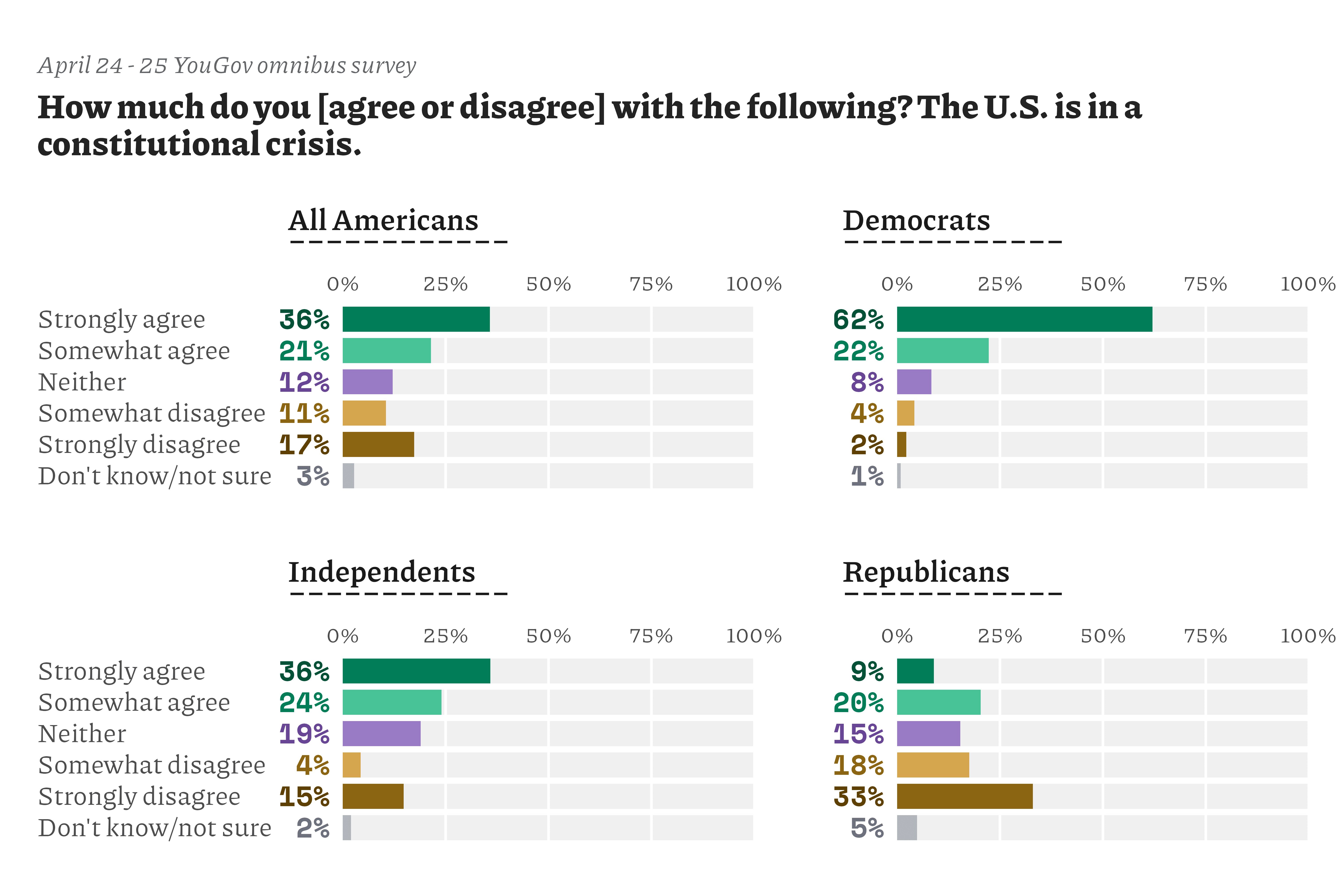Americans Believe the U.S. Is in a Constitutional Crisis
American democracy is built on a constitutional system of government that divides authority between the states, Congress, the courts, and the president. This separation of power is meant to stop any one of them from exercising too much influence.
Since President Trump took office again, our country’s safeguards—including the division of power between states and the federal government and other checks and balances—have been tested like never before. The Trump administration’s attempts to circumvent Congress, refusal to comply with court orders, and false and concerning statements that the judicial system cannot check executive power present a direct threat to our democracy.
With this conflict among the branches, a majority of Americans believe the United States is in a constitutional crisis. Surveys conducted by States United show Americans have an accurate sense of what a constitutional crisis means: A breakdown of the normal constitutional order. Americans link a constitutional crisis to the executive branch’s continued abuse of power and a breakdown of our system of checks and balances.
Because people see a constitutional crisis as an erosion of the rule of law and a lack of accountability for political figures, it’s important for pro-democracy state officials—from governors to attorneys general to secretaries of state—to use specifics and assert their authority.
This analysis is based on two national surveys conducted in partnership between States United and YouGov of 1,008 registered voters between April 24 and 25, 2025 and of 1,019 registered voters between February 19 and 21, 2025. Responses held steady between the two surveys.
- Most Americans agree that the U.S. is in a constitutional crisis.
- The group of Americans who agree is politically diverse. More than half of Democrats and independents agree that the U.S. is experiencing a constitutional crisis, along with 3 in 10 Republicans. Just over half of Republicans disagree.
- Across the political spectrum, Americans understand that a constitutional crisis is a breakdown of the normal constitutional order that goes beyond typical politics.
Among the Americans polled in April, 57% somewhat or strongly agree that the U.S. is in a constitutional crisis, while only 28% somewhat or strongly disagree. Over 80% of Democrats and about 6 in 10 independents express some level of agreement, along with 29% of Republicans. About half of Republicans report some level of disagreement.

When Americans hear the phrase “constitutional crisis,” many themes come to mind, including around separation of powers and adherence to the rule of law. Here is what they shared in response to an open-ended survey question.
Breakdown of checks and balances: When States United asked Americans what comes to mind when they hear the phrase “constitutional crisis,” many pointed to unprecedented or atypical conflict among the branches of government.
Executive overreach: Americans were also concerned that the executive branch might overstep its authority and ignore the Constitution.
Lack of accountability: Americans thought that a constitutional crisis could be linked to the erosion of rule of law and unchecked political corruption. They worried that certain government officials, particularly the president, would engage in illegal activity and face no consequences.
Disregard for the Constitution: Americans linked a constitutional crisis to the erosion of democratic values and principles and to their fears that those in government would ignore or violate the Constitution.
Increased polarization: Americans also pointed to broader political issues that could lead to a constitutional crisis, including intense polarization and partisanship and disagreements over the interpretation of the Constitution.
The survey done between February 19 and 21, 2025, is based on 1,019 interviews conducted on the internet of U.S. registered voters. The survey done between April 24 and 25, 2025, is based on 1,008 interviews conducted on the internet of U.S. registered voters. Participants were drawn from YouGov’s online panel. Respondents were selected to be representative of American adults. Responses were additionally weighted to match population characteristics with respect to gender, age, race/ethnicity, education of registered voters, and U.S. Census region based on voter registration lists, the U.S. Census American Community Survey, and the U.S. Census Current Population Survey, as well as 2020 presidential vote. The margin of error for the February survey is approximately ± 3.3 percentage points and ± 3.5 percentage points for the April survey, though it is larger for the analysis of partisan subgroups described above. Therefore, sample estimates should differ from their expected value by less than the margin of error in 95% of all samples. This figure does not reflect non-sampling errors, including potential selection bias in panel participation or measurement error.